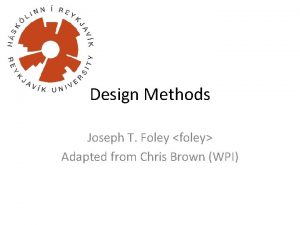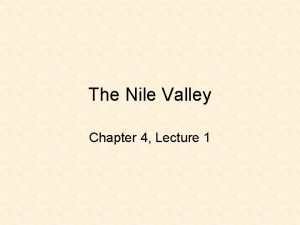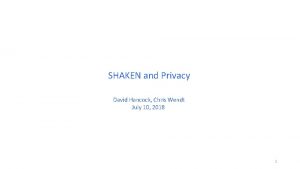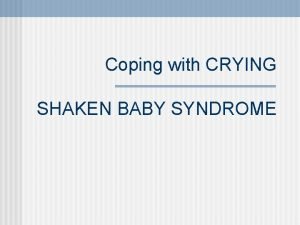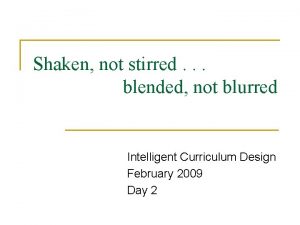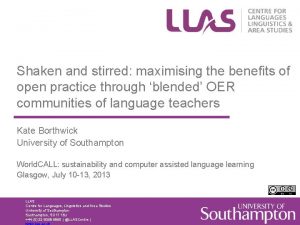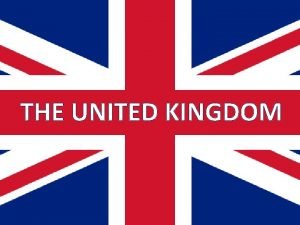United Kingdom Shaken Not Stirred the Unintended Consequences












- Slides: 12

United Kingdom – Shaken, Not Stirred? ; the Unintended Consequences of Austerity What We Heard, Impressions, and Insights – Justine Akman / Michael Collins February 2019 Certificate Program in Public Sector Leadership and Governance – Cohort 13 – Visit to London, England

Brexit: why it looks so crazy to us • What you’re seeing in Parliament is a reflection of the margin by which the ‘Leave’ vote prevailed (or is it 52% “rounded up to 100%? ”); people’s attitudes have not changed. • The opening up of profound cleavages that are not being addressed: urban/rural; intergenerational; economic class; national/sub-national (e. g. , Scotland); and influence of ‘fear’. • Seeking a “Global Britain” – but is this realistic in a time when ‘British exceptionalism’ is diminished and in an environment where multilateralism/global trading is being tested? • The opening up of big issues – citizenry mobility rights; payments to the EU; and the Northern Ireland ‘back-stop’ (impact on ‘Good Friday’ agreement). • Britain already has an asymmetrical privilege e. g. , . economic / trade benefits while opting out of a number of treaties (e. g. , Maastricht, 1990); • ‘Incoherence’ of Leave vote areas that receive significant EU transfers/benefits; citizenry voting against self-interest. • The current political parties – has Labour lost its way (e. g. , Scotland decline)? • Sheer complexity of the Brexit project and the trade-off of not addressing key issues – education, housing, welfare, climate change, etc.

Importance of History: the inevitability of Brexit • Historical reality of UK’s ambivalent relationship with Europe • EU: becoming more powerful. o 2 layers: common currency, inner circle of Euro-zone; no common statehood. Ø Predictions that Euro-zone will have to integrate even further; precipitating a more imbalanced union; Ø Common sentiment that EU would not flex for Britain; and, Ø Concerns about Opt-Outs no longer being workable (e. g. , Justice, data). • Blaming the EU: when citizens hold the EU responsible for poor performance, but are unable to sanction an EU incumbent, they lose trust in the EU as a whole. • Pressures of immigration: o Britain not immune to blaming “the other” despite being generally more accepting of diversity; absence of border control; and o Some first generation migrants themselves voted for leave. “When I look at Jeremy Hunt, still trying to blame the EU for everything even now – like an orphaned calf nuzzling the festering corpse of its mother, because it’s his instinct and that’s all he’s got – I take some comfort. At least the politicians are losing something too. - July 2018, the Guardian

Disenfranchised elements of the population – rise in global inequalities – what’s going on on the ground? • Britain is one of the most unequal of all developed countries o 31%percent of the country's income goes to 10% of its people. o The richest 10% holds 45%, while the poorest half owns less than 9%. • Precursor to Brexit wasn’t just inequality; it was an enormous economic slump o Crash of 2008 dwarfed earlier recessions of the 1970 s and early 1980 s, and was both longer and deeper than the crash of 1929. o In 2010, after the financial crash, UK had a coalition government. o Decline of manufacturing; 86% of economy is services (London-centric. ) How much will Brexit exacerbate these issues?

The Austerity Agenda – The ‘Smoking Gun’ • Link between austerity and Brexit: significantly decreased the deficit by increasing taxes, reducing spending, and cutting services. • In September 2018, PM May announced “end of austerity”, but it did not really happen. Just stopped speaking about it. o Most services will likely have to continue to be cut • Impacts of cuts: clear evidence of ongoing gap between spending and demand (Institute on Governance) o Limited evidence of credible plans to keep discussion going with citizens o Concerns about prisons, adult social care (eldercare), hospitals, children’s social care (preventative services cut), police, criminal courts deductions • Death of the High Street: 1, 772 shops disappeared from Britain's town centres last year, as 18. 2 p of every £ 1 forked out by shoppers is spent online • Would have been a dominant issue moving forward; Brexit ‘distraction’. • “We are all in this together. . ”…. however, the withering of the State, exacerbation of class cleavages, and economic dislocation.

Scotland – the Brave? • Referendum – September 2014 o 55% remain, 45% independence; o Alex Salmond resigned as first minister, replaced by Nicola Sturgeon; and o The “Vow” and agreement to devolve/transfer (Smith Commission). • Scotland voted (62%) to remain in EU. • Shifting political terrain - 2017 General Election: SNP lose 21 seats from prior election in 2015; Conservatives won larger proportion of vote; Labour party weak. • Scottish economy: o no longer reaping the same revenues from North Sea oil; limited exports; pockets of growth (e. g. , IT); o aging population; o difficult to attract people to stay; outmigration; o Scotland wants different migration policy; and, o Time for a reinvention given the limited capacity. • Scotland spending plans are not sustainable.

Scotland (2) • Migration: Scotland has different attitude to migration compared to England: o Welcoming to refugees - exists at political level, but not necessarily in general population. o Need to attract low skilled workers recognized at political level. Ø Had Syrian resettlement program in rural areas. • In context of Brexit: o Volume of engagement stepped up in wake of EU exit o Official level working on EU exit issues including on the creation or establishment of UK wide frameworks. o Alex Salmond, sexual assault charges; blow to independence movement.

Northern Ireland / ‘Good Friday’ • Extremely small in terms of population and geography; disproportionate effect at present given the DUP. • People in Catholic community will never vote for someone on “other side”. • Governed by forced coalition. No political executive for past 2 years. DUP & Sinn Fein need to come back to table. • Budgets are being rolled forward but in cash terms; business community frustrated as investments going to south Ireland, need Ministers. • Civil servants: worried about their obligations, can’t develop policy, can’t take bold decisions because they might be judicially reviewed. When government comes back, they will look at what has happened. • Does back-stop protect the Good Friday agreement or threaten it? Constitutional experts say different things; need some clarity through a dispute mechanism tribunal.

Civil Service: Creativity Under Pressure • Flexibility: o Government has become more elastic: cross-cutting capabilities (e. g. , China; trade; parliamentary capability; devolution capability – working on different constitutional impacts of 4 countries). • Creativity: o EU exit is an accelerator functionalization – doing things across civil service rather than in silos (e. g. , group staffing in certain categories). o 70 policy projects; 600 agreements; member state engagement; business outreach; payment to EU • Resilience: o Departments have been trying to map out various routes Brexit could lead to that minimized the adverse economic consequences of exiting. In terms of economic impact, there is no solution to the problem. Looking at “least worst option”. o No deal, breakdown in social order, everything stays the same – planning for all scenarios o Doubling up on first grade of civil service. 2 people in each senior position. At least 10 k civil servants working on Brexit – corporate systems keeping up well o Over £ 4 billion dedicated to Brexit preparations o Civil servants moved around to critical functions

Civil Service Creativity Cont’d. • Diversity: o Striving to have a civil service that is regionally, ethnically, gender and economically representative. Ø Cultural dimension: Seeking to become the most inclusive employer by 2020; Faith and Belief Champions. Ø Moved from competency based assessments to “success profiles”. Looks at experience (technical skills); behaviours; strengths; aptitude. § Requires people to be more rigorous about how they define jobs; forces people to be clear about how they will do selection (job design gets better); § Trusting managers to make right decisions; leads to upskilling. • How much damage to the Public Service? Will need to articulate what has come out of the process; leverage success stories; switch back to ‘normal’ operations.

For Canada – why we shouldn’t be smug: referendum/direct democracy • Parallels in referendum processes: • Called at time the Government in power struggling in the polls and with internal coherence • Assumed success • Sudden discovery of love – too little too late? • Rearing of xenophobic tendencies - “we have been defeated…by money and some ethnic votes” - Jacques Parizeau, Oct. 30, 1995 • Do we learn from the questions we ask

Final Thoughts • Reminder that the nation-state matters to people o Sense that it is the actor that protects people’s rights when citizens do not see that happening at the international level. o Basic premise around the primacy of making your own laws (in your own country) o Rise of identity politics • Britain’s loss of voice in Europe and the world o UK is unique in not having a far right party represented in it Parliament at all o Rise of Germany…doing well with China and India. Balancing influence of UK gone…single power in EU • Implications for Canada: former colony, with common values; common approaches; joint stances in the UN system and international crises: rise to the challenge of seeking to broaden / deepen the relationship. • The role of a new CETA +++ agreement (? ) • Leadership • Senior leaders do not have time to reflect; rely on past experience; the importance of adaptive leadership – lessons from managing in chaos; • Empowerment and inclusion (not command/control) • The importance of ‘duty of care’ along with fairness; relationships; and reciprocal altruism; • Ensure we are asking the right questions – what are the options; what happened last time; what do we need to do to engage; and what are others doing; and, • Nurture “rebels” at work. • How the simplicity of core change management principles can be broadly applied, namely: committed leadership; clear priorities; communication; compelling change; cadence and coordination of delivery.
 Unintended consequences
Unintended consequences Unintended consequences
Unintended consequences We will not be moved when everything around is shaking
We will not be moved when everything around is shaking Old kingdom middle kingdom new kingdom
Old kingdom middle kingdom new kingdom Nnn ruled
Nnn ruled Old kingdom middle kingdom new kingdom
Old kingdom middle kingdom new kingdom Capital of egypt during the old kingdom
Capital of egypt during the old kingdom Verstat parameter
Verstat parameter Baby shaken syndrome signs
Baby shaken syndrome signs Stir shaken rfc
Stir shaken rfc Shaken baby syndrome symptoms
Shaken baby syndrome symptoms Characteristics of the percussion family
Characteristics of the percussion family Verstat parameter
Verstat parameter

